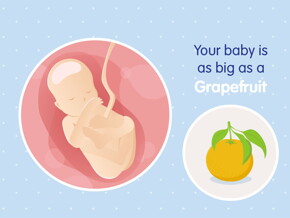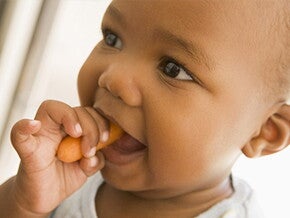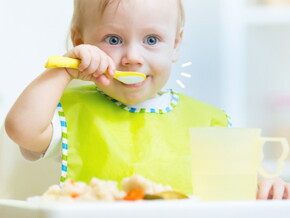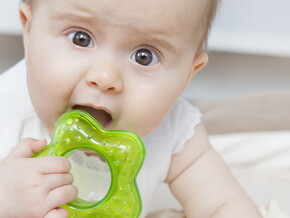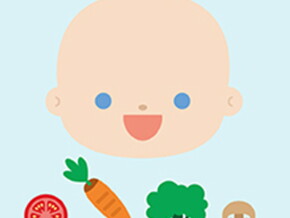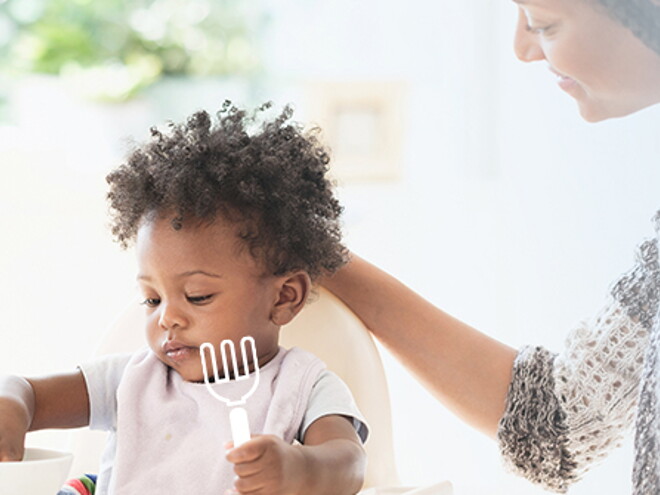
What’s your feeding style?
Scene 1: You sit down for lunch with your baby. She’s eating a smaller portion of your meal, chopped into bite-sized pieces. She eats quickly and then signals she wants more. Do you…
- Refill her bowl up to the top and insist she finishes every spoonful before she can go and play.
- Tell her there’s no more food and she’ll have to wait until dinner time.
- Give her another portion alongside some cookies or cakes.
- Offer some more food in her bowl and see what happens. If she eats that and still wants more, she can have some. If she loses interest, respect that she is finished.
Scene 2: Sitting around the family dinner table, your baby eats two mouthfuls of food then pushes her plate away, signaling she’s had enough. You ask her if she would like any more food, but she shakes her head. Do you…
- Feed her yourself, using every technique you can think of. Even if it takes a long time, it is worth it to make sure she eats.
- Take her plate away but say there’s no dessert or food until breakfast.
- Take her plate away and replace it with a bowl of sugary foods you know she’ll love. At least that means she’ll eat something!
- Take her plate away and let her get down from the table if she is finished.
Scene 3: It’s breakfast time on the weekend and you’re all sitting down together with a selection of healthy foods on the table. She chooses her favorite (oatmeal with banana) but instead of eating it, she decides it’s more fun to smear around her face or throw on the floor. Despite your firm, repeated “no,” she continues to play, thinking it has become a game. Do you…
- Take the bowl out of her reach and spoon-feed her yourself. It may become a battle of wills, but you won’t let her leave the table until she has eaten as much as you think she should.
- Take the bowl of oatmeal away but when she reaches for some fruit, tell her she can’t have any until her cereal bowl is empty.
- Take the bowl of oatmeal away, go to the kitchen and make her favorite high-salt, high-fat breakfast instead.
- Throwing food indicates that the meal is over. Take the bowl away and let her get down from the table.
Scene 4: It’s your baby’s first birthday and you’ve made a birthday cake for the family. Your baby reaches to put her fingers into the cake. Do you…
- Remove the cake from her sight and push her to eat all her vegetables instead.
- Remove the cake from her sight—she’s not allowed cookies or sweat treats and she knows it. The rules are different for grown-ups!
- Let her have a slice of cake and if she asks for another, she can enjoy that, too. It’s only a bit of sugar—what harm can it do?
- Allow her to explore and taste a small slice of cake with the family. Offer her fruit or vegetable sticks if she’s still hungry afterwards.
Scene 5: For dinner you’re offering two healthy foods that you already know your baby likes, and two things she’s never tried before. She only eats the two familiar foods. Do you…
- Not let her get down from the table until she has eaten at least two bites of the new foods.
- Remove the familiar foods and next time only offer the new foods.
- Make a note not to offer the rejected foods again and stick to things you know she will eat.
- Let her finish her meal without eating the new foods, but offer them again next week.
Mostly a)s
Your feeding style is… PUSHY
When your baby shows you signs she’s had enough, you choose to ignore her or think that you know her hunger and fullness level more than she does. For you, it is essential that your baby eat the amount of food that you think is best for her. A completely clean plate or bowl is the sign of an extra-successful mealtime.
The dangers of being PUSHY: Pressuring your baby to eat more food than she wants may have a negative effect on her growth and development and may lead to unhealthy weight gain. Forcing her to finish her food or take “one more bite” can result in over-encouragement of eating. This style can also result in your baby having little interest in food, more food fussiness, and an unhealthy attitude towards food when she’s older. If your baby doesn’t eat much at one meal or over the course of a day, try not to worry. Respect her hunger and fullness cues and know that she will probably make up for it at the next meal or tomorrow.
See The dos and don’ts of responsive feeding for a helpful reminder of good feeding practices for you and your little one.
Mostly b)s
Your feeding style is… OVERLY STRICT
You tend to withhold food by offering a very small portion and not allowing your baby to have more, even when she shows you signs she’s still hungry.
The dangers of being OVERLY STRICT: This restrictive style of feeding can lead to unhealthy growth. Alternatively, it can lead to “rebellion” where your child overindulges in food, including high-calorie snacks. Babies whose parents are overly controlling about food may not learn to recognize their own hunger and fullness cues, and may not be able to self-regulate their food intake. Respecting your baby’s hunger cues is more likely to lead to healthier eating habits when she’s older. Notice if your baby has any particular gestures to tell you she’s hungry and encourage her to express her feelings to you.
See The dos and don’ts of responsive feeding for a helpful reminder of good feeding practices for you and your little one.
Mostly c)s
Your feeding style is… INDULGENT
What your baby wants, she gets. It doesn’t matter if the food is high in sugar, salt, fat, or tummy-filling “empty calories”; her wishes are always granted by you. You tend to offer her favorites as you know she’ll eat them without a fuss.
The dangers of being INDULGENT: This style of feeding may keep her smiling for now, but isn’t the best thing for your baby’s health in the long-term. Babies whose parents are overly indulgent have been shown to have unhealthy weight gain, “food fussiness,” or other unhealthy eating patterns as young children. It may also mean she’s missing out on essential nutrients to grow and develop. Avoid trying to offer only her favorites at every meal or mini meal.
See The dos and don’ts of responsive feeding for a helpful reminder of good feeding practices for you and your little one.
Mostly d)s
Your feeding style is… RESPONSIVE
Congratulations on reacting to your baby’s signs of hunger and fullness appropriately! Your non-emotional balance of gentle guidance and encouragement will help your baby develop healthy-eating habits that can last for years to come.
The benefits of being RESPONSIVE: Offering a variety of healthy foods at meals, including some that you know your little one enjoys, and letting her decide which to eat (without pressure), encourages a positive attitude towards food. Respecting your baby’s hunger and fullness cues can lead to healthier habits and growth in childhood and beyond.
Sources
Black MM, Aboud FE. Responsive feeding is embedded in a theoretical framework of responsive parenting. J Nutr 2011; 141(3): 490-4.
Dattilo AM Programming long-term health: Effect of parent feeding approaches on long-term diet and eating patterns. In: Early nutrition and long-term health, mechanisms, consequences and opportunities. Ed., Saavedra and Dattilo, Elsevier, 2017: 471-95.
Thompson AL, Adair LS, Bentley ME. Pressuring and restrictive feeding styles influence infant feeding and size among a low-income African-American sample. Obesity (Silver Spring) 2013; 21(3):562-71.






